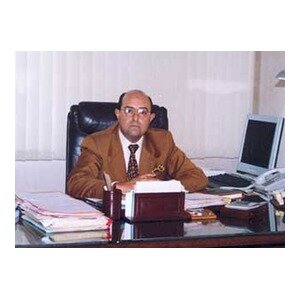Best Climate Change Law Lawyers in Morocco
Share your needs with us, get contacted by law firms.
Free. Takes 2 min.
Or refine your search by selecting a city:
List of the best lawyers in Morocco
About Climate Change Law in Morocco
Climate Change Law in Morocco encompasses the legal frameworks, policies, and regulations designed to mitigate and adapt to the impacts of climate change. As a country especially vulnerable to water scarcity, changing weather patterns, and desertification, Morocco has recognized the need for strong legal and regulatory measures. The government has implemented national strategies and participated in international agreements to promote sustainable development, renewable energy, and environmental protection. These efforts are reflected in Morocco's commitment to the Paris Agreement, its ambitious renewable energy goals, and the integration of climate considerations into national planning.
Why You May Need a Lawyer
Hiring a legal expert in Climate Change Law can be essential for navigating the complex and evolving regulatory landscape in Morocco. Common situations where legal assistance is beneficial include:
- Businesses seeking to understand and comply with environmental and climate-related regulations
- Renewable energy project developers dealing with permits, licenses, and environmental impact assessments
- Farmers and agricultural entities addressing land use issues, water rights, and adaptation policies
- Individuals or organizations involved in environmental litigation or disputes
- International investors requiring guidance on Morocco’s climate frameworks
- Non-governmental organizations (NGOs) advocating for stronger climate action and needing legal interpretation
- Citizens concerned about environmental harm or participating in public consultation processes
A lawyer specializing in Climate Change Law ensures compliance, helps minimize legal risks, and supports clients in taking advantage of incentives and opportunities related to climate-friendly initiatives.
Local Laws Overview
Several key laws and regulations shape the climate change legal framework in Morocco:
- National Charter for Environment and Sustainable Development (2011): This foundational document outlines Morocco’s commitment to environmental protection, the right to a healthy environment, and the principles of sustainable use of natural resources.
- Climate Change Policy: Morocco has a comprehensive national climate change policy, including the National Climate Plan (PNRC) and various sector-specific strategies focused on adaptation, energy efficiency, and emission reductions.
- Renewable Energy Laws: The Renewable Energy Law (Law No. 13-09) promotes the development and use of renewable energy sources, providing legal frameworks for licensing, grid access, and investment incentives.
- Environmental Impact Assessment (EIA) Laws: Laws require EIAs for projects likely to impact the environment, ensuring climate considerations are part of project planning and approval.
- Water and Agriculture Regulation: Given Morocco’s water scarcity, laws regulate the sustainable use and management of water resources and encourage climate-adaptive agricultural practices.
- International Agreements: Morocco is party to the UNFCCC, the Paris Agreement, and has pledged nationally determined contributions (NDCs) to reduce greenhouse gas emissions.
Understanding these regulatory frameworks is essential for compliance and effective climate action.
Frequently Asked Questions
What is Climate Change Law, and how does it apply in Morocco?
Climate Change Law refers to the legal principles and regulations aimed at reducing greenhouse gas emissions, protecting the environment, and adapting to climate impacts. In Morocco, it is reflected in a variety of laws, strategies, and international commitments.
Who is affected by Climate Change Law in Morocco?
Any individual, business, or organization whose activities impact the environment may be subject to climate-related regulations. This includes sectors such as energy, agriculture, construction, transport, and manufacturing.
What are Morocco’s main strategies to combat climate change?
Morocco’s main strategies include promoting renewable energy, improving energy efficiency, sustainable water management, fostering climate-adaptive agriculture, and implementing its Nationally Determined Contributions under the Paris Agreement.
Do renewable energy projects need special permits in Morocco?
Yes, renewable energy projects are regulated by specific laws and require various permits and approvals, including environmental impact assessments, which must consider climate implications.
Can individuals or civil society challenge environmentally harmful activities?
Yes, individuals and organizations have the right to participate in public consultations and can take legal action if environmental laws or regulations are violated.
What incentives are available for climate-friendly activities?
Morocco offers tax incentives, subsidies, and grant opportunities for renewable energy, energy efficiency projects, and other environmentally sustainable initiatives.
How does Morocco enforce its climate change laws?
Enforcement is carried out by various governmental agencies through monitoring, inspections, administrative sanctions, and judicial proceedings if laws are violated.
Are international investors protected under Morocco’s climate legal regime?
Yes, Morocco’s legal framework accommodates and protects foreign investors, especially in the renewable energy sector, provided they comply with local regulations.
What role does public participation play in environmental law?
Public participation is a key principle, with opportunities for citizens and NGOs to be involved in environmental assessments, policy development, and monitoring.
How can a lawyer help with navigating climate regulations?
A lawyer provides expert advice on compliance, represents clients in disputes, assists with permit applications, prepares legal documentation, and offers risk assessments tailored to climate law requirements.
Additional Resources
For further information and assistance, the following resources and organizations can be valuable:
- Ministry of Energy Transition and Sustainable Development: The main governmental body overseeing climate policies, renewable energy, and environmental regulation.
- Moroccan Agency for Sustainable Energy (MASEN): Focuses on the development and promotion of renewable energy projects.
- National Environmental Observatory: Provides data, statistics, and monitoring of environmental conditions and policies.
- Moroccan Environmental Law Association: Offers legal expertise and advocacy in environmental and climate law matters.
- International NGOs and Institutions: Such as the United Nations Environment Programme and the World Bank, which provide legal and technical resources related to climate change in Morocco.
Next Steps
If you need legal advice or representation regarding Climate Change Law in Morocco, consider the following steps:
- Identify your specific legal needs and gather relevant documentation or information about your issue or project.
- Research and select a qualified lawyer or law firm specializing in environmental or climate change law in Morocco.
- Schedule an initial consultation to discuss your case, clarify your objectives, and understand the legal options and potential challenges.
- Follow your lawyer’s guidance for compliance, litigation, or negotiation as needed.
- Stay updated on policy changes or new regulations that may impact your activities or legal responsibilities.
Taking these steps will help ensure you are fully informed and legally protected when dealing with climate change-related matters in Morocco.
Lawzana helps you find the best lawyers and law firms in Morocco through a curated and pre-screened list of qualified legal professionals. Our platform offers rankings and detailed profiles of attorneys and law firms, allowing you to compare based on practice areas, including Climate Change Law, experience, and client feedback.
Each profile includes a description of the firm's areas of practice, client reviews, team members and partners, year of establishment, spoken languages, office locations, contact information, social media presence, and any published articles or resources. Most firms on our platform speak English and are experienced in both local and international legal matters.
Get a quote from top-rated law firms in Morocco — quickly, securely, and without unnecessary hassle.
Disclaimer:
The information provided on this page is for general informational purposes only and does not constitute legal advice. While we strive to ensure the accuracy and relevance of the content, legal information may change over time, and interpretations of the law can vary. You should always consult with a qualified legal professional for advice specific to your situation.
We disclaim all liability for actions taken or not taken based on the content of this page. If you believe any information is incorrect or outdated, please contact us, and we will review and update it where appropriate.
Browse climate change law law firms by city in Morocco
Refine your search by selecting a city.

















